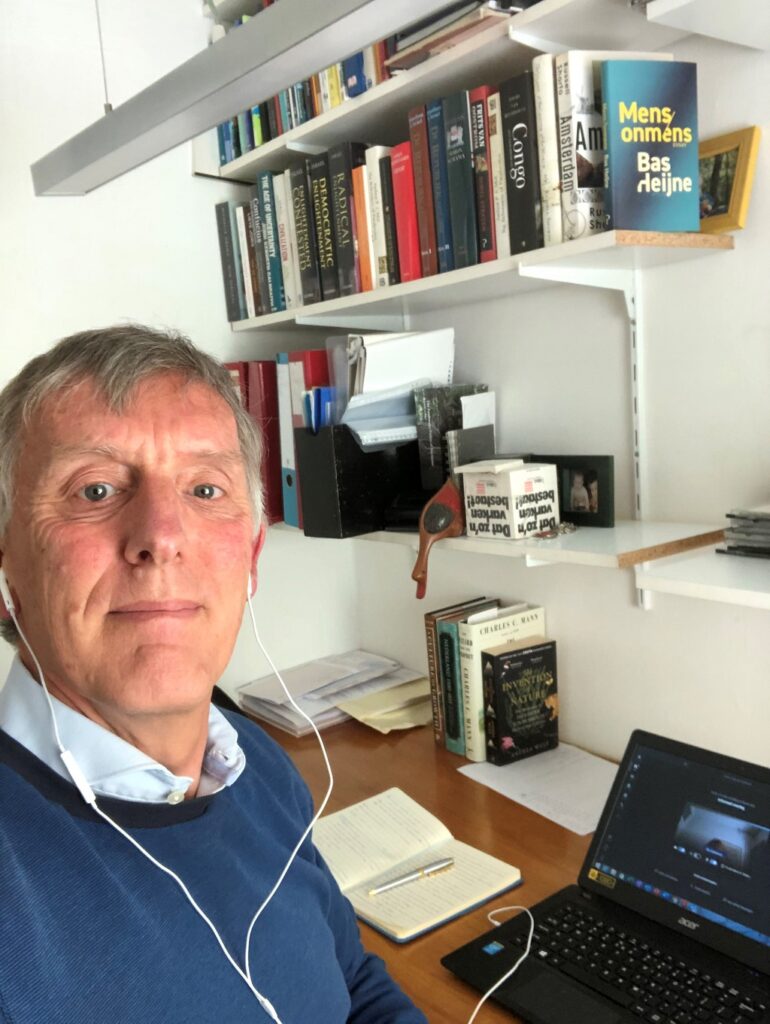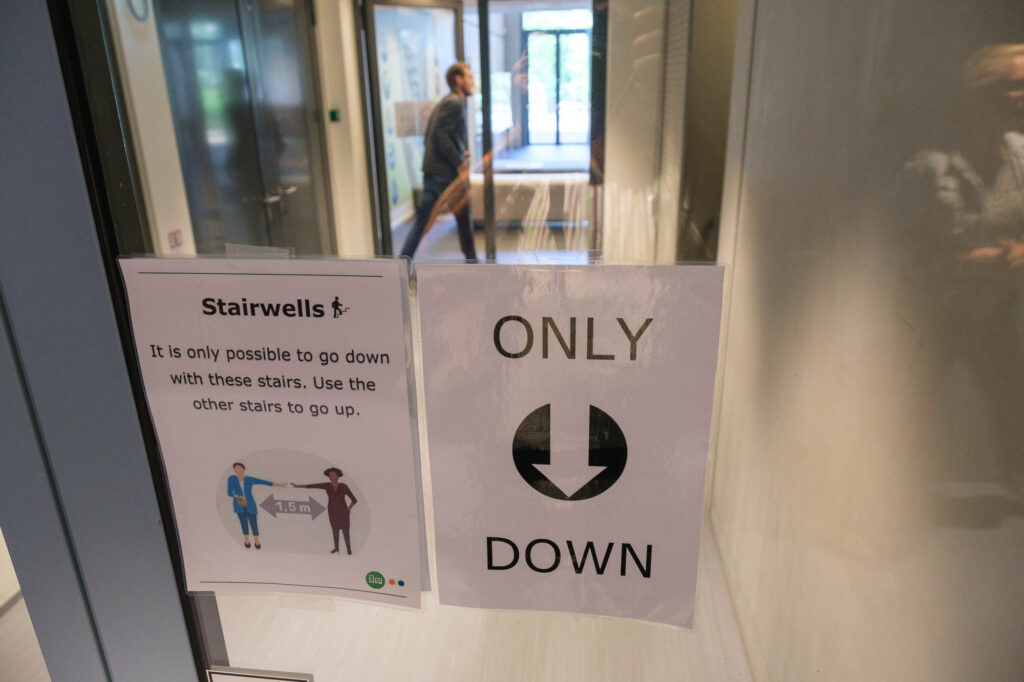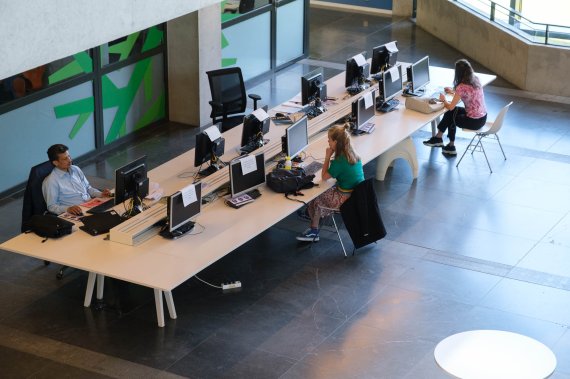For the rest of this academic year, students will not be coming to the campus much. Staff are still being advised to work at home too. But as the next academic year approaches, people need to know what the prospects are. Is there any point in first-years moving to Wageningen, for example? The Executive Board is now working on scenarios for how to open up the campus from September. Board member Arthur Mol and education director Arnold Bregt outline the contours of the one-and-a-half-metres university.

What do you have to offer first-year students in the new academic year?
Bregt: ‘We want to maintain the core qualities of a Wageningen education. These qualities are: a personal approach; education in small groups to facilitate interaction between students and teachers possible; working on real problems and gaining skills through lab- and fieldwork. We want to prioritize these things on the Wageningen campus. And we shall have to respond to how the coronavirus crisis develops.
‘In the new setting, we will create a combination of education on campus and virtual classrooms. We want to work adaptively: on campus if we can, online because we can.’
Mol: ‘And we want to maintain the international classroom on campus. So we are inviting international students to come to Wageningen too, both physically and virtually. It will be a dual system, in which students come together on the campus in small groups, as well as attending online lectures and working on assignments.’
One quarter of the teaching on campus, and the rest digital?
Mol: ‘Indeed, we are thinking in terms of 25 to 30 per cent of the teaching on campus in the first half of the next academic year. More than that doesn’t seem realistic at the moment. Public transport is one difficulty. The cabinet has decided that students are not allowed to travel during the rush hour, so we shall have to adapt lecture times to that. We definitely want to let the finalists do their experiments on campus. To do that we need to adapt the campus facilities for group work and practicals so that students can sit one and a half metres apart.’
Bregt: ‘I’ve got a solution for students who want to get around the public transport problem caused by the corona crisis. Come and live in Wageningen.’
Is the number of international students plummeting?
Mol: ‘With regard to the European students, we are now consulting our European partner institutions with a view to letting exchange programmes go ahead next year as much as possible. We will take a decision on that on 15 June. The situation for the non-European students is more complicated, given the travel restrictions. I can imagine that the Chinese students who register, will take classes online from China at first and maybe come to Wageningen in February 2021 to be taught here on campus.’
What is the campus going to look like, in terms of teaching facilities, canteens and the library?
Mol: ‘We’ll make provision for social distancing and one-way traffic throughout all the buildings. The labs for practicals will have one third of their normal capacity, and the teaching will have to be adapted to that. There will also be fewer work stations to study at: probably about half. The library and canteens will probably open in the new academic year, with limits on the number of places. We are also thinking of making use of parts of the old Dreijen campus in town again. There is room for group work there. And lastly: time is space. We might have to extend our normal timetable, with more hours in a day. Especially if we are affected by the directive that says: no students on public transport in the rush hour.’
Bregt: ‘I think too that the students can do their bit for campus education by bringing along their own laptops. With the coronavirus measures, fewer students can be in the labs and computer rooms, but if they bring their own laptops the options increase, including for group work and computer practicals.’
What are the implications of the coronavirus for research?
Mol: ‘In that respect we need to make a distinction between Wageningen Research and the university. The work of Wageningen Research has largely continued under the new hygiene measures. The odd research assignment has been postponed, but new projects have also been added because of the corona crisis. People mainly work from home, but they also work in the lab where necessary.
‘At the university, most of the PhD and postdoc researchers’ work in the lab and at home has continued too. A few PhD researchers have gone back to their home countries, so in those cases the lab work has ground to a halt, and fewer experiments can take place on campus in the one-and-a-half-metre labs. Two chair groups closed their labs for a few weeks, but they have opened them again now. Research is getting delayed a bit, but compared with other universities, it’s not too bad.
‘We told the PhD students: adapt your work, write an article instead of doing the experiments you had planned, or make some adjustments to your research to avoid falling behind with it. Up to now that’s working well, but if this corona crisis goes on, we shall run up against more and more problems and delays.’
Who gets to work on campus soon?
Mol: ‘If you don’t need to work on campus, you work at home. That will be the rule until September at least. After that we are considering the option of allocating work locations. PhD students and staff who need a lab will get priority. And so will staff with social reasons for needing to work on campus – people who can’t easily work at home. And we shall bear in mind international students and staff who don’t have an extensive network in Wageningen. We want to work towards a coronavirus exit strategy in which we give staff access to the campus on a phased and rotating basis. People who don’t really need to be there, like Arnold and me, will be the last in line.’
Bregt: ‘I was on campus this morning because I still teach GIS courses with a colleague. When you team-teach, it’s nice to do it on campus. In the GIS group, everyone works at home but from time to time it’s nice to see your team again and catch up. I think we should also facilitate campus sessions for teams from September.’
And which students get to come to the campus?
Mol: ‘We want to set priorities there too. As we have said, we want to give the finalists the chance to come to campus if they need facilities. But we also want to give priority to the first-years, on both the Bachelor’s and the Master’s programmes. First-years need to form a bond with the university and build up a network. You don’t do that at your computer, but by meeting other students on campus. A good relationship with teachers and other students increases motivation and success at university. With a bit of luck, second- and third-year students already have that sense of connection. And of course, the introduction – the AID – that we will be organizing in August will help with that too.’

Fieldwork and internships for students are a tricky point for the time being, due to the restrictions. Surely that could delay graduation for students?
Mol: ‘We want as many exchange opportunities as possible to go ahead. We are looking into what is still possible. For example, we are currently consulting the other Dutch universities about having more exchanges between the minors of the universities, so students can still gain knowledge and experience beyond Wageningen. As for the internships: students can still do internships in the Netherlands. Internships outside Europe are difficult, but I am expecting opportunities to arise in the coming months in countries such as Sweden, Denmark and Germany.’
Bregt: ‘We also notice that MSc students can still go ahead with their internship plans by organizing something themselves. A few international students are now going to do an internship in their own countries, with supervision from Wageningen. And we are seeing the rise of the e-internship, especially in food companies, because it’s business as usual for them during the corona crisis. In these internships, students do their literature study at home first and then go to the company to do research in a controlled environment. Some food companies have already made arrangements for this kind of e-internship.
‘And a lot of programmes offer the option of replacing the internship with a second thesis project. Or students decide to do their final thesis first and then their internship. We are finding that the teachers and students are dealing with the corona crisis creatively and innovatively.’
The transition to digital education seems to have gone smoothly and successfully.
Bregt: ‘Indeed, the teachers have worked extremely hard on making their courses online only. After period 5 they immediately started evaluating their teaching themselves and making improvements.’
Mol: ‘I am curious to see the student evaluations of the online education. The Executive Board wrote to the teachers to tell them the course evaluations of period 5 wouldn’t count in their personal evaluations. We thought teachers shouldn’t be judged on online education that had to be put together from scratch at great speed. But we got a few indignant responses from teachers. They said they had gone all out to create good online education and were keen to have their students’ evaluations. Wonderful to see that level of motivation. So we adjusted the plan straightaway and are going to evaluate the courses after all.’
Teachers have had to put a lot of overtime into the courses.
Mol: ‘Right. My biggest worry is that the teachers who have made massive efforts to switch the courses to online forms will just go on slogging away. My advice is: after period 6, take a break, time off, get away from your work. Take a good holiday. And we are not going to do any resits in the summer holidays. It’s not on, the teachers need a break, and so do the students.’
What is the financial damage from the corona crisis?
Mol: ‘We haven’t got the figures yet, but this is going to cost money. We’ll get fewer students and we can do less research because of the crisis. How much less depends on how long the restrictions remain in force. Also, we don’t know how big the economic impact is going to be. Will there be a recession, and if so, for how long? One positive is: we’ve got reasonable reserves. We are aiming for continuity, so we are not making any cuts this year. We shall calculate what the corona crisis is costing us in the autumn. We are already holding consultations with the education ministry about who will bear those costs.’
What is the monthly shortfall so far?
‘There is no monthly figure. The income from the Sports Centre has stopped, which is a couple of hundred thousand a year, but that is not disastrous given our total budget. Here or there, research contracts have been postponed or cancelled, but that’s not disastrous either. We are also getting extra coronavirus-related research assignments. The crucial thing for the extent of the damage is: how long will this crisis go on?’
Do you have questions about this subject? Mail them to Resource, resource@wur.nl. We will have a digital question time with Arthur Mol and Arnold Bregt on the 8th of June. You can attend this meeting. More information will follow.

 Photo: Guy Ackermans
Photo: Guy Ackermans